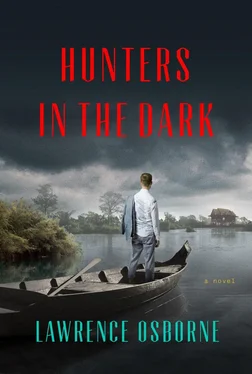The carpets had not been cleaned in a while and yet after half an hour he had found nothing. He went through the bathroom, found nothing again, and then showered. Drying off, he lay on the bed and smoked and looked up at the yellowed furnishings. So the English barang had moved on, but to where had he moved? Davuth had refrained from asking the girl point-blank; it would make him look suspicious. Now he went down to the lobby and found that the girls had left for the night and a male clerk was there. Man to man was a little easier. He tried the ten dollars again and got the man to talk about recent arrivals and departures and soon he had found S. Beauchamp in the book but no forwarding address. The man told him to try the drivers outside. The same guys were always there.
Davuth went into the street and the drivers tossed him a few words. He lit up and puffed a bit and waited for them to calm down. He strolled over and asked if they knew the English boy. One of them said that he had taken him around a bit.
“A blond kid about twenty-eight?”
“I took him to Colonial Mansions.”
“What’s that?”
The man offered to take him there.
“Then let’s go,” Davuth said. “Is it a hotel?”
“It’s serviced apartments.”
“Fine,” Davuth cried, and patted the man on the back.
He was rather enjoying himself now.
They drove through a dry, early-winter evening with the rain now holding off. The boulevards swarming, the lights temporarily reliable and on. The rain would come later that night, but for now it was merciful. The lovely nights of winter were coming.
—
The new karaokes overflowed, the Koreans and Japanese and Chinese abundant. The tuk-tuks filled with barang families and haughty Khmer-Chinese girls in long silk dresses studiously turned away from eye contact.
He had come along that same boulevard many times thirty-five years earlier and he always remembered whenever he was there. The people alive now, the young, did not understand anything about the city they inhabited. They didn’t know its underlying nature. It was as if centuries had passed since then. In Year Zero of the Revolution that same teeming city had been almost entirely empty. The government ministries, the S-21 prison, a few posts here and there — at night it was as dark as the countryside, you could walk through it without meeting any human life. It was a city of torches and whispers. There were fires at the corners, patrols threading their way through the labyrinth. Strange to recall, he had felt very safe there. It was not unlike the village from which he had come. On sandals cut from old tires, one could walk silently, one could go unnoticed. Even the electric light of the present incarnation of the city struck him as faintly incredible, absurd. A complicated joke designed to humiliate the previous generations. When he thought of the things he had seen as a teenage soldier along those same wide streets it made him wonder if sanity was even possible in this world. The men casually shot at street corners during comatose sunlit afternoons and were taken away on carts. An eighty-year-old grocer begging for his life under the trees on Street 19, then bayoneted by teenagers. Just momentary visions glimpsed for a split second, like the symbols on playing cards. The nights when the city sank into silent darkness, seemingly unpopulated. The buildings emptied out, where they roamed and slept and played cards and shot dogs. Rumors: a foreigner being held at S-21, one of two Australian yachtsmen captured off the coast, forced into a tire on Mao Tse-tung Boulevard and burned alive.
Davuth had been attached to the M-13 camp in the jungle so he was already habituated to this system. To save you is no gain, to kill you is no loss! The blood debt! He wondered now — speeding along this capitalist boulevard — if he had ever believed in Communism. For what was Communism? The movement had begun one fine day in 1968 with the attack on Bay Daram, a few miles from his parents’ house in Battambang. It had even emerged, then, from his own region. He was only ten but news of the attack went around like wildfire. It was the first modest move of the Angkar, the first blood drawn. But the Angkar was deeper than Communism; it came out of the distant past. Under the Angkar, sleep itself was prohibited. Ever since he had had trouble sleeping. He thought of it as “rest,” as if the illegality of sleep had been established in his subconscious and could not now be uprooted. And so for the rest of his life he had been almost continuously wide awake. How many nights he and his patrol had wandered across the city hunting in the dark for traitors, for bourgeois elements, for saboteurs and trash who he already knew did not exist. They had freedom to kill whoever they wanted. If they heard a noise in an empty building they went in and killed the rats and the dogs, and sometimes an old woman sleeping on newspapers. The hunt itself was the meaning of Angkar.
The Leader had been right, cities are whores. They put on their gay makeup and forget. Davuth didn’t mind; it was the way of the world.
—
At Colonial Mansions he paused for a moment and glanced up at the cream facade. In the lobby there was no one. The receptionist gave him a cool and unwelcoming stare. It was a barang dormitory, for sure.
“I’d like to see a unit I could rent for a week.”
“We’d need a deposit,” the boy said indifferently.
Davuth agreed to it and they went up and looked at a unit on the fourth floor. He asked if the place was full at that moment.
“Ninety percent,” the boy said.
It was much more comfortable than the Paris. The barang had money. When they had left the unit Davuth stepped to the balcony alcove and looked down at the pool. The windows opposite were lit, comfortable sitting rooms and bedrooms with bright tropical curtains. Around the pool the deck chairs were empty and in it a Chinese woman, as always, swam lengths, making no sound whatsoever. A curious place. The best thing would be to book the unit for a week and take his time. He resolved to do that, then went down with the clerk and sat in the lobby café and ordered an orange juice. It was still quite early and from time to time guests and residents came in and walked up to their apartments through the swimming-pool area. He asked if he could smoke, was told that he could not, then demanded an ashtray and smoked anyway. Two hours passed. Young Korean girls came in and out, employees of some large construction company nearby, and a handful of aging barangs with Khmer girlfriends. The usual trade. He flexed his fingers and thought to himself that his daughter was right and that he really ought to give up smoking. Now was the time.
When it was clear that he was waiting for nothing he booked the unit at the Mansions, paid for it in cash and took the same tuk-tuk back to the Paris. The rain exploded over the streets. The driver asked him if he really wanted to go back to his room.
“You have a place to go?” Davuth said.
It was on Street 282, the driver said. Near the stadium.
All right, Davuth said wearily. A long time since he had enjoyed himself with anyone. Months, maybe. Now was the time for that too.
The downpours always caused the traffic to knot up and paralyze everything. They crawled through chaos toward the stadium and even on the lonely streets leading to it the vehicles were trapped in slow-motion convulsions, the surfaces suddenly turned into water. Down came the plastic wraps on the tuk-tuk but he was soon soaked anyway. He gave in to the moment. One got soaked and there was nothing to be done. At the end of Street 282 there was a darkened corner where it met the main road alongside the stadium and there on the left was a doorway with a group of men huddled under plastic ponchos. There was an entrance with a doorman holding a flashlight and roaring gutters all around.
Читать дальше












